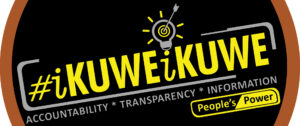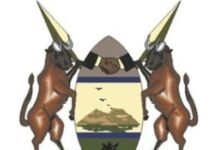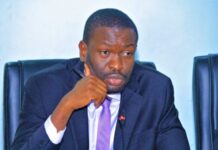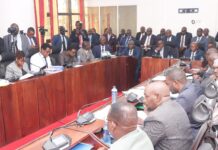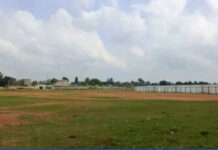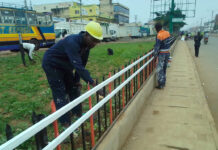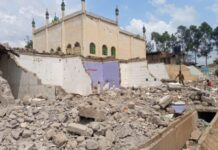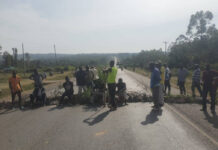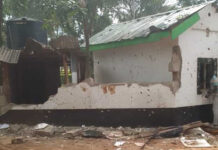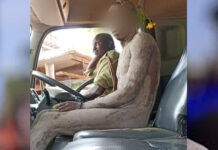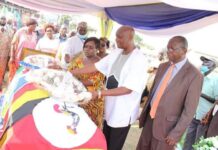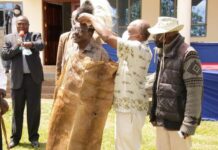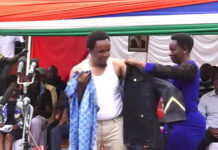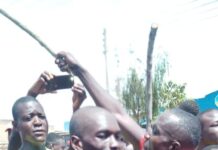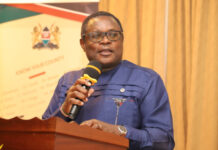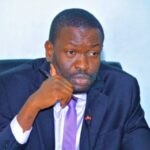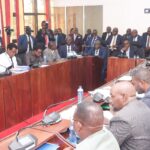Kenyan President Uhuru Kenyatta today 12th Nov 2020 delivered his Seventh State-of-the-Nation Address during a Joint Sitting of Parliament in line with Article 132 of the Constitution. Follow link for full statement.
It reads…
THE SEVENTH (7TH) STATE OF THE NATION ADDRESS BY H.E UHURU KENYATTA, C.G.H., PRESIDENT OF THE REPUBLIC OF KENYA AND COMMANDER-IN-CHIEF OF THE KENYA DEFENCE FORCES AT PARLIAMENT BUILDINGS, NAIROBI ON NOVEMBER 12TH 2020
On November 12, 2020 In Latest News
The Speaker of the National Assembly,
The Speaker of the Senate,
Honorable Members of Parliament,
Distinguished Guests,
Fellow Kenyans,
It is my great pleasure to join you today as I report to the People of Kenya on the State of Our Nation.
I return to this esteemed chamber to deliver my Seventh State of the Nation Address in a House that I had the privilege of serving in for eleven years; five years on the opposition benches as the Leader of the Official Opposition and for six years as a Cabinet Minister. My mixed bag of fortunes whilst in this House, affirms the possibilities of our Nation.
Mr. Speaker and Hon. Members, as a reminder of our sacred duty to our beloved Nation, and in renewal of our solemn pledge to God and to one another, let us reflect on these words:
O God of all creation
Bless this our land and nation
Justice be our shield and defender
May we dwell in unity
Peace and liberty
Plenty be found within our borders.
May the words of our National Anthem inspire us all to serve faithfully; and with hearts filled with thanksgiving.
Mr. Speaker, today, as I deliver the State of the Nation Address, I will also report on the measures taken and the progress achieved in the realization of our National Values in line with Article 132 of our Constitution.
Finally, I will submit to the National Assembly a Report on the Progress Made in Fulfilling the International Obligations of our Republic, as well as a Report on the State of our National Security.
Mr. Speaker,
I wish from the onset to assure you that the State of our Nation is STRONG, RESILIENT and BRIMMING WITH THE PROMISE OF AN EVEN BRIGHTER TOMORROW.
Hon. Members,
I deliver this State of the Nation Address in the midst of extraordinary global economic, social, and health disruptions, which have not spared us. Those disruptions necessitated the rescheduling of this Address for about Six Months.
Before I embark on that solemn constitutional duty, I note with satisfaction the critical role Parliament has continued to play in facilitating and driving the realization of our National Vision by appropriating resources; and by oversighting the Executive, the Judiciary and the County Governments.
I particularly commend both Houses for your superlative support for the measures sought by the Executive with regard to the National Emergency Response to the Coronavirus Pandemic; and for approval of all statutory instruments issued under the Public Health Act and the Public Order Act, as part of the containment measures rolled-out to stem the spread of this deadly disease.
I also convey my gratitude to the National Assembly for the expeditious consideration of my nominees to various state offices including Ambassadors, High Commissioners and Permanent Representatives to Kenya’s mission abroad. I note with appreciation that our latest state nominee; being our Nation’s inaugural Data Commissioner was duly considered by the House.
Mr. Speaker Sir, I am pleased to confirm to this House, that the roll out of the unique personal identification number (Huduma Namba), with all its attendant benefits, is now fully on course.
Hon. Members,
We are desirous of accelerating the implementation of our National transformative Agenda.
In this regard, I urge Parliament to prioritize the consideration of various seminal Bills that are pending before the Legislature, such as the National Aviation Management Bill, which once enacted, will anchor the turnaround of the Pride of Africa – our National carrier, Kenya Airways.
Also before the House, is the Statute Law Miscellaneous (Amendments) Bill, Business (Amendment) Bill No. 2 of 2020 and proposed legislation on the administration of referenda and on enhancing governance and on deepening our anti-corruption efforts.
Hon. Members,
As we ushered the third decade of the 21st century, we were invaded by locusts threatening to decimate our food baskets and the livelihood of millions of our farmers. In the far Eastern part of the Globe, a new disease (Covid-19) was emerging, devastating millions of people.
The World Health Organization declared the COVID-19 outbreak a Public Health Emergency of International Concern on 30th January 2020, and a Pandemic on 11th March 2020.
The COVID-19 Pandemic has led to an unprecedented loss of life, global economic slow-down; the postponement of major cultural, religious, political, and sporting events including the 2020 Olympic Games.
It also led to the shutting down of borders and airspaces; the closure of institutions of learning; disruption of production and supply-chains; a massive strain on health systems in every nation on earth; and tremendous pressure on individuals, families, communities and entire nations.
On 28th February 2020 through Executive Order No. 2 of 2020, I established a framework to upscale and co-ordinate Kenya’s preparedness and response to the Coronavirus threat. Kenya’s first case of COVID-19 was confirmed on 13th March 2020.
In the days and weeks that followed, my Government put in place a series of public health measures, to stem the spread of COVID-19.
These included Kenya’s first ever nationwide curfew since independence; the restriction of movement into and out of the most affected counties; the shutdown of learning institutions; a ban on public and social gatherings; restrictions on the number of passengers in public service vehicles; among other containment measures.
Our health institutions also ramped up their preparedness by training their staff on management of the disease; by creating isolation areas; and by procuring and deploying the relevant equipment and medication. Despite these commendable efforts, as of this morning, Thursday 12th November 2020; we have reported a total of 66,723 confirmed cases of the COVID-19 in our Country and sadly also a total of 1,203 deaths since this tragedy fell upon us, out of which 23 persons succumbed to the disease over the last 24 hours.
Our hearts go out the families who have lost loved ones to Coronavirus. Our thoughts and prayers are with all those who are undergoing isolation or treatment with respect to this disease. We wish them a quick and complete recovery.
Mr. Speaker and Hon. Members of our August Houses of Parliament, I now request all of you to rise on your feet and join me in observing a minute of silence in honour and in memory of the 1,203 Kenyans, who have succumbed to the deadly disease.
[moment of silence]
Mr. Speaker,
We must not succumb to COVID fatigue. We must not ‘back truck’ from our vigilant fight against this pandemic. On our part as leaders, our stamina for discipline must not diminish. If the people fall short of giving their best at this time, we the leaders have no option but to give our all. We must “…know the way, go the way, and show the way”.
Mr. Speaker, we also once again honour and commend our frontline health workers across the Country, and we shall be forever grateful for their service under tremendous strain and challenging conditions.
We also recognize and honour all our other first responders, frontline staff and essential workers; who have selflessly gone, above and beyond, the call of duty and ensured that the Kenyan Flame continued to burn bright.
Honourable Speakers,
The COVID-19 Pandemic began against the backdrop of a steady economic growth rate of 5.4% in 2019. Our focus in implementing the Kenya Vision 2030 and its medium term plan dubbed the Big Four Agenda had been bearing fruit. As result, most of the major economic sectors evidenced impressive growth last year; including manufacturing, agriculture, tourism, and financial services.
When it became apparent that the COVID-19 Pandemic threatened to erode the significant economic gains we had made in 2019 and the preceding years; on 25th March 2020, I, announced State interventions to cushion Kenyans against adverse economic effects of the COVID-19 Pandemic, that warranted the National Exchequer to forgo taxes amounting to Ksh. 176 Billion annually. These tax measures included:
The temporary suspension of the listing with Credit Reference Bureaus (CRB) of any person, Micro, Small and Medium Enterprises (MSMES) and corporate entities whose loan account had fallen overdue or was in arrears;
The immediate reduction of VAT from 16% to 14%;
100% Tax Relief of all persons earning up to Ksh. 24,000.00
Reduction of Pay as You Earn from 30% to 25%;
Reduction of Corporation Tax from 30% to 25%;
That all Ministries were to pay at least Ksh. 13 Billion of the verified pending bills so as to improve liquidity in the economy and ensure businesses remained afloat by enhancing their cash flows; with the private sector also being encouraged to clear all outstanding payments owed within itself;
The Kenya Revenue Authority was directed to expedite the payment of all verified VAT refund claims amounting to Ksh. 10 Billion within 3 weeks; or in the alternative, allow for the offsetting of Withholding VAT, in order to improve cash flows for businesses;
That Ksh. 6.0 billion from the Universal Health Coverage kitty was to be immediately appropriated strictly towards supporting counties and the recruitment of additional health workers to support in the management of the spread of COVID-19;
The lowering of the Central Bank Rate (CBR) to 7.25% from 8.25% so as to prompt commercial banks to lower interest rates applicable to their borrowers, and thereby availing much needed affordable credit to MSMEs across the Country;
The lowering of the Cash Reserve Ratio (CRR) to 4.25% from 5.25% so as to provide additional liquidity of Ksh. 35 Billion to commercial banks in order to directly support borrowers that were distressed as a result of the economic effects of the COVID-19 pandemic; and
That the Central Bank of Kenya was to provide flexibility to banks with regard to the requirements applicable to loan classification and provision of loans that were performing as at 2nd March 2020.
My Administration, with the Support of Parliament, further initiated an 8-Point Economic Stimulus Programme amounting to Ksh. 56.6 Billion.
The major objective of the programme was to return the economy to the growth trajectory it was on pre-Corona by increasing demand for local goods and services, cushioning vulnerable Kenyans, securing household food security for the poor, and creating employment and incomes.
Most importantly, the programme sought to enhance liquidity in support of the business sector, particularly micro and small enterprises.
Accordingly, My Administration set aside a further Ksh. 5 billion for the operationalizing the Credit Guarantee Scheme.
The Recovery Programme also targets to revamp a broad spectrum of economic sectors by hiring 5,000 health workers and 11,000 interns; even as it supports our teachers as they continue to enhance the delivery of knowledge to our children.
It further seeks to create 100,000 job opportunities for the youth, besides implementing a subsidized farm input scheme for vulnerable households. Part of the resource allocated, will be utilized on the ongoing fabrication of 250,000 school desks, crafted by local artisans.
Mr. Speaker,
Despite the very difficult times that we have faced as a Nation, our People have remained resilient.
In the face of tremendous economic challenges and the health crisis we are facing, the majority of us have truly been our Brother’s Keeper.
Not only have we stood with our family members and friends going through hard times, we have acted responsibly by following the laid-down public health directives.
We are not yet out of the woods, and so I urge all Kenyans to keep doing that which is honorable and right. As a Nation, we will overcome and thereafter soar to even greater heights.
Mr. Speaker,
The COVID-19 Pandemic has brought to the fore the urgent need for us to upscale our implementation of the Universal Health Coverage pillar of the Big Four Agenda.
Which pillar seeks to eradicate the ‘poverty of dignity’ and transition our nation into an era where no Kenyan should be forced to sell their land in order to settle their medical bills; or be forced to make a choice between buying much needed medicine and using the money to feed their children.
Last year, I informed Parliament that the National Government, in partnership with the County Governments, was piloting the Universal Health Care programme in the Counties of Nyeri, Machakos, Kisumu and Isiolo in preparation for a roll out nationwide.
I am pleased to report to you that the pilot programme for Universal Health Care was successfully implemented, and out of it we have isolated critical learning points that have informed enhancements to my Administration’s health policy priorities, going forward.
As we itch closer to the national rollout of the Universal Health Coverage, a fortnight ago, I launched the Biometric Registration for the Universal Health Coverage Scheme. Similarly, my Administration is instituting far-reaching reforms of NHIF as its perfects the medical insurance scheme.
Mr. Speaker,
It is notable there has been phenomenal increase in mental illness across the country and around the world, which has caused serious national distress and anguish in our families. As a caring Government, I have established an Office in the Ministry of Health, with the full responsibility of spearheading our national response to this latest disruption to our social order and our nation’s wellness.
To institutionalize this seminal initiative, I, have issued an Executive Order establishing an ultra-modern National Mental Health Hospital by elevating Mathari National Teaching and Referral Hospital as a semi-autonomous specialized hospital.
The East Africa’s Premier Mental Health Facility will now offer training and research in psychiatry, specialized psychiatric services, forensic psychiatric services, child and adolescent mental services and substance abuse related and addictive disorders treatment and rehabilitation services.
Challenges to our public health notwithstanding, I am confident that in partnership with County Governments, we are on course to realize the aspiration of the Universal Health Coverage for all.
Honourable Members,
A Nation’s future is its children. As custodians of and trustees for future generations, it is our duty to protect, nurture and mould our young children into responsible citizens. Our children embody the only true guarantee of the continuity of this Project that we call Kenya.
To this end, my Administration continues to institute far-reaching reforms within our education sector. In January last year, we successfully commenced the roll-out of the Competency Based Curriculum, an exercise, which, while not without its challenges, is one that has nevertheless been fully embraced by all stakeholders in the education sector.
As at the end of 2019 calendar year, we had been able to achieve a textbook to pupil ratio of 1:1 for grades 1 through to 3.
I assure this distinguished sitting that the journey to replace the 8.4.4 system with the new fit-for-purpose curricula, is well underway, and refinements are being undertaken in the course of implementation.
As a parent and a grandparent, I share in the pain and frustration of most parents in having our children home for nearly an entire year. However, as a responsible Government we put the health and safety of the Children as the paramount consideration.
The gradual and phased reopening of schools that began with the examination classes is being carefully monitored at all levels so as to ensure that our Young Kenyans are safe and secure as they continue preparing for their national examinations.
The Ministry of Education will, within 14 days from the date hereof announce the 2021 Academic Calendar, with all other classes expected to resume learning in January 2021.
Still on the subject of our basic education, I made a commitment to the Nation during my last State of the Nation Address that no child should be left behind, meaning no child would be denied the right to access quality education.
I am pleased to report to this House that for the second year running we have been able to achieve a transition rate of 100% from primary to secondary school.
Even as we prepare to reopen schools, no child will be left behind, even those that have regrettably transitioned into being young parents.
Mr. Speaker,
However, in the face of these undoubtedly impressive gains we must guard against resting on our laurels. The next frontier in the quest to improve education in Kenya is enhancing quality of education, both in terms of physical structure as well as content.
It is evident that our public day and boarding secondary school infrastructure is overstretched and as a result, our students are suffering congestion in their classes and dormitories.
These challenges, however real, must not stop us from pursuing what we know to be the right thing for our children. Rather, they should motivate us to work even harder.
Through a combination of interventions both policy and financial involving the Ministry of Education, County Governments and Members of the National Assembly through the National Government Constituency Development Fund, we shall have the necessary resources to address the infrastructure gap in our education sector conclusively within the next 24 months.
In this regard, I appeal to you to re-prioritize the use of the discretionary funds under your oversight, to respond to the immediate and short-term needs of our learners. Currently, there is an urgent need for construction and equipping of more dormitories, classes, and other amenities to facilitate further ease of learning for our children.
Conscious of the fact that significant financial resources will be deployed towards the construction of at least 12,500 new classrooms and related school facilities. In that regard, the Ministry of Education and the Ministry Transport, Infrastructure, Housing and Urban Development will by 1st December, 2020 issue a new set of building guidelines for school infrastructure that allows the use of appropriate and cost effective building technologies suited to the varied geographies of our Nation.
The intention of these guidelines will be to achieve transparent and standardised bills of quantity that will guarantee value for taxpayers’ money. For every shilling that we put into school infrastructure, we must seek to obtain more classes built to acceptable standards.
Fellow Kenyans, Honourable Members,
On the state of our economic development, at Article 132, read with Article 10 of our Constitution, I am required to report to Parliament on a wide array of economic, social and relational achievements. I call the sum total of all these achievements our economic development.
Economic development is not about intentions and activities; it is about results. It not the volume of what we did; it is about the impact of what we achieved. In other words, economic development is the measure of the tangible positive transformation of the wellbeing and quality of life of our People.
During this year’s reporting, I will focus on four areas of primary thrust, and situate the four areas within the broad framework of the Big Four. I must mention from the out-set that the Big Four is not a project as many may think.
The “Big Four” is an economic development strategy or framework, which I have used to organize government delivery and to answer the question ‘WHY’ in terms of the selection of the priority areas we are working on.
The philosophy of the BIG FOUR is anchored in four intentions which we have pursued relentlessly this year, despite the pendency of COVID-19. The first one is liberating our urban poor from the ‘poverty of dignity’ caused by poor housing and inadequate services.
The second is transitioning our young people from being ‘earners of wages’ to ‘owners of capital’.
The third is building a holistic base of human capital that is food secure and health assured. And the fourth is jump-starting the shift from being a country of net consumption to one of production. This has been our “WHY” for the Big Four during this difficult year.
Let me begin my report to you by discussing the ‘poverty of dignity’ visited upon our urban poor. It is, indeed, a shame that, almost sixty years after independence, a majority of our urban dwellers live in a ‘dignity poor’ environment.
Their sanitary conditions are inhumane, and their habitations are deplorable. Our intention is to reverse this, and the Nairobi Metropolitan Services is a pilot project that has been successful in rolling back the frontiers of this urban indignity.
The other intervention we have engaged in is that of affordable housing under the Big Four. My Administration’s pilot project at Park Road, Nairobi is the first beacon on this transformative Journey. This was delivered ahead of schedule and within budget.
We have also concluded the successful incorporation and capitalization of the Kenya Mortgage Refinance Corporation.
This Corporation, will improve mortgage affordability, increase the number of qualifying borrowers, and result in the expansion of the primary mortgage market and home ownership in Kenya while also deepening the capital markets through large-scale medium to long-term refinance options.
I would also like to report that there are ongoing reforms in the land sector to improve access to land as a factor for development.
Towards further promoting and sustaining Kenya’s national development, the National Land Titling Programme continues apace. During My Administration, 4.5 million titles have been issued in the seven (7) years since 2013; as compared to the six (6) million issued from 1963 to 2013.
These are not merely abstract statistics. They represent very real gains for mwanachi and the resolution of longstanding historical land injustices. For Example, in Samburu County only 2,000 group ranches were titled by the preceding Administrations; but up to early this month, my Administration alone had issued 10,000 titles, and by January of 2021, we are on course to have issued a further 15,000 titles.
To restore fully the sanctity of title, we are digitizing all the land records across the Republic. This national endevour is anchored under the National Land Information Management System (NLIMS). The system is designed to enhance security of land records, improve accessibility, and dramatically reduce the cost of land transactions.
I call on all stakeholders, including the Law Society of Kenya, to embrace and support this positive transformation that removes land information management in Kenya from its current 19th century systems and standards, those of the 21st century.
Other reforms in the sector include the formulation of the Sectional Properties Bill to bring legal clarity to the ownership of sectional properties. This Bill is in its final stages before introduction in this esteemed House.
Hon. Members,
Let me underscore that eradicating the poverty of dignity is not just about secure tenure and dignified habitations. The poverty of youth dignity is also one of the areas we have focused on.
Youth pessimism and fatalism, can be turned to patriotism, if Youth are liberated from the poverty of dignity. We have worked hard to give Youth self-esteem and a sense of purpose.
We have done this because dignity comes from self-reliance and a sense of contributing to society. If the youth are given a sense of national importance, they will ‘own’ the country and guard it jealously as active ‘shareholders’. Initiatives such as contracting youth artisans as suppliers to the Big Four Projects is a visible example of this successful approach.
The second intention under the Big Four during this reporting period has also been about young people. My Government’s objective has been to shift our young people from being ‘earners of wages’ to ‘owners of capital’. We have modelled this through engaging them in collective action.
As we seek to grow our industries and create jobs in the manufacturing sector, we must of necessity have the manpower, with requisite skills to match the needs of industry.
Majority of the skills required are with respect to blue-collar jobs that need young men and women who understand the basics of the digital economy and who have the capacity to deploy both knowledge and ingenuity as they seek to solve practical problems.
It has taken considerable effort on the part of my Administration to educate both parents and young people that there is a viable education pathway for form four leavers who do not achieve the necessary grades to pursue university programmes. This pathway is anchored on the Technical and Vocational Training Programme. Today I am proud to report that we have so far enrolled 430,598 students into 182 technical/vocational training colleges across the Country.
The curricula for these institutions has been developed in partnership with industry stakeholders in varied sectors of our economy ranging from automotive assembly, oil and gas, maritime and shipping to agro-processing. We are also collaborating closely with technology partners to develop curricula for basic digital skills to allow our young people to take advantage of opportunities within the digital economy.
Just last month, I launched a Boda Boda Scheme meant to bring together 1.4 million riders in that sector, who collectively support 5.2 million families across the country. In aggregate, these riders make a total of Ksh 357 billion a year, which is more than the total disbursements to the 47 counties by the National Exchequer, which presently stands at Ksh 316 billion annually.
With these statistics in mind, it is clear that boda boda riders can come together and become owners of capital and the holders of major investments. We are encouraging them to engage in saving schemes and to work together in order to create a capital base that will enable them to own petrol stations, boda-boda assembly factories and other investments that will transform their lives.
Shifting our youth to become ‘owners of capital’ also requires us to develop productive capabilities that move them from rudimentary to complex operations. This is partly why we have revived RIVATEX as a producer of textiles and consumer of locally produced cotton. This is in line with the Agricultural Transformation Strategy that obliges the growth of new strains of bio-technical cotton as a key area of opportunity for Kenyan farmers.
The manufacturing pillar of the Big Four also aims to provide some training ground for our young people to acquire skills and replicate them in light industries.
The third intention under the Big Four during this reporting period has been to develop a holistic human capital base. Our intention here has been to expand our health infrastructure and to guarantee that the individual is free from want and free from fear.
Similarly, and in support of the holistic individual, I would like to report that measures aimed at achieving food security are already in place. The implementation of the Agricultural Sector Transformation and Growth Strategy is well underway. We have also successfully reformed the Agricultural Inputs Subsidy Programme.
If we can achieve this intention of developing a holistic human capital base, we will increase our national productivity and enhance our economic development.
The fourth intention of the Big Four under this year’s economic development agenda is the commencement of the journey from being a country of net consumers to a country of net producers.
In order to make this shift, we must admit that we cannot experience any significant progress in manufacturing and agro-processing without the building of transport systems and making significant investments in energy.
Hon Members,
Even as we mooted the Four Intentions, we recognized then, as we still recognize now, that the task of ending the indignity of not having decent shelter; the task of enhancing access to Universal Health Coverage; the task of enabling all who are willing to live in dignity through the sweat of their brow to thrive, and the task of ensuring food and nutrition security; would not be completed in a single term of office.
That being the case, we give our solemn vow that by the end of 2022, we would have laid an unshakable foundation for the realization of this vision, which is a shared aspiration for millions of Kenyans.
As an enabler to the Big Four Agenda, my Government continues to roll out seminal programmes in response to the needs of businesses both large and small.
We are continuously enhancing the ease of doing business and creating an enabling environment for all our enterprises to thrive. Earlier this week, I, commissioned a Transit Shed at the Kenya Railways, Nairobi, dedicated as the clearing point for cargo imported into the country by our small traders, saving them the agony of delayed clearing of their trade wares as well as saving them considerable financial cost.
The dividends of our sustained reforms and investments over the last few years, continue to enhance our nation’s competitiveness and ranking globally.
We have recorded many milestones thus far, such as Kenya’s 80-slot improvement since 2014, with our Nation currently ranking at 56th globally and ranking 3rd in Sub-Saharan Africa on the Ease of Doing Business Global Ranking Report, from a low of 136th globally in 2014.
As an affirmation of our place of pride within the community of nations, Kenya now ranks 1st in Protecting Minority Investors and 4th Globally on Getting Credit.
The Number of companies registered daily has increased by 500% from 30 in 2014 to 200 in 2020, and a daily average of 300 during the COVID-19 period. On aggregate, 400,000 companies are annually now registered in Kenya.
My Government has heeded the cries of Kenyans for bold and decisive actions to reduce the unnecessary regulatory burden occasioned by the multiplicity of licenses at both the national and county levels. Our initial focus in Nairobi City County has seen the waiver of Single Business Permits for all new businesses registered in Nairobi for the first 2 years of their operations, effective March this year. We also have waived the presumptive tax requirement for all new businesses.
These two initiatives and others within our Ease of Doing Programme will now be aggressively rolled-out nationwide; as we endeavor to make it even easier for both local and international investors to set-up, operate and expand their businesses. Our endeavor is to make Kenya the best country on the Continent in Doing Business by the year 2022.
As we continue to create an enabling environment for our enterprises to thrive, we are also enhancing connectivity in the Country through ports, road and rail.
In respect to key national trunk roads, the construction of the Nairobi Expressway Project continues apace. Just last month, I witnessed the signing of Africa’s largest Public-Private Partnership funded project – Nairobi-Mau-Summit Express Way.
These are milestone projects, which will have significant positive impact on the economy, by decongesting Nairobi’s gateways on the part of the Expressway Project and by opening up the economies of and increasing connectivity in Western, Rift Valley and Central Kenya on the part of the Nairobi-Mau-Summit Project.
Hon. Members,
With regard to Ports and Bridges, the Lamu Port Berth-One is now complete, and the focus has shifted to bringing it into full operation for trans-shipment purposes. My Administration is also in the final stages of installing the Likoni Floating Bridge; a 824m long bridge costing Ksh 1.96Billion that will be the first automated floating bridge in Kenya.
The Likoni Floating Bridge will help to decongest ferry transport at the Likoni Channel in the context of COVID-19 safety concerns and beyond by providing alternative safe pedestrian connectivity between Liwatoni on Mombasa Island to Ras Bofu on the Likoni mainland side. Further, the Kisumu Port Rehabilitation works are complete, and the new port is already processing fuel products to Uganda.
On our Railways, two days ago, I commissioned the Nairobi Commuter Railway Upgrades, which are set to dramatically change the public transport experience in Nairobi and across the Metropolitan Area. Additionally, we are undertaking rehabilitation of the meter gauge railway line along various routes. The Nairobi to Nanyuki route is now back in service after decades of dormancy, with the Naivasha to Kisumu route currently undergoing an overhaul under multi-agency team coordinated by the Kenya Defense Forces.
With regard to the energy sector, the last mile connectivity programme crossed the 7.2 million household connections mark and the Country is proceeding well towards the aspiration of 100% universal electricity access by 2022. We have also completed a National Geo-Spatial Mapping exercise that has allowed us to catalogue the wealth of our natural resources. It will also enable us to improve the management and use of land, the essential but finite resource we share as a Nation.
To protect all these undertakings, Hon. Members, I am required to submit a report on the state of our national security pursuant to Article 240 of our Constitution.
Honourable Members,
The State of our national security is STRONG. Our homeland is secure from the varied threats against it. For this, on behalf of all Kenyans, and as Commander-in-Chief, I give thanks and praises to the brave men and women of our security services.
The terrorists continue to be routed, arrested and prosecuted. Their plots are detected and disrupted before they can cause serious harm to more innocent Kenyans. The war against crime and criminality continues apace, driven by a National Police Service that continues to undertake technological, human resource and skills reforms to better serve Kenyans.
While we celebrate the state of our national security, our region is increasingly unstable. We are witnessing the escalating conflicts being caused by ethnicised and regionalised competition for political power. As has always been the case, we are working hard to support peace and reconciliation processes where they are needed the most. We seek to export our peace and pragmatism to our region knowing that success will further secure our Nation.
Honourable Members, we must always remember that the wages of bad politics is the people’s suffering and ruin. Many neighbouring countries need a handshake, they need a politics in which competition is not turned into enmity. They need political leaders focused on including the young and desperate not inciting them to revolt against their country and their elders.
We have learned as Kenyans that elections alone cannot bring peace and unity to a divided people. For that, leaders must reach out to each other and build bridges over turbulent waters to allow the people to cross into safety and prosperity.
Our state of national security will remain strong as long as we practice inclusive and sober politics. I ask the Members of this House, all leaders, and all Kenyans to deeply ponder their role in promoting the politics that assures our security, deters our enemies, and is focused on serving the people.
My Administration is also implementing the following reforms in the security sector: the expansion of the National Police Service Control and Command Centre for surveillance and communication; and the successful launch of the Digital Occurrence Book Pilot Project.
In addition, I recently unveiled the national security innovations exhibition at the Kenya Wildlife Service (KWS) Law Enforcement Academy in Manyani, Taita Taveta County.
This was a youth-driven innovative project aimed at leveraging on technology to address problems facing citizens; from cyber security, crime, revenue collection gateways and social media communication to geospatial mapping, and resource consolidation and even small arms manufacturing.
My Government recognizes the important role played by ICT and innovation in overall national development.
Information communication technology has greatly improved access to government services and enabled Kenyan youth access job opportunities outside Kenya. To ensure Kenyans continue to enjoy these benefits, My Administration has increased access to ICT infrastructure and connectivity through the roll out of the Basic Voice Infrastructure in 67 sub-locations in un-served areas.
To improve access to information and e-government services, My Administration has also established 135 Constituency Innovation Hubs across the Country.
Honorable Speakers,
As part of my functions as President, I am required to submit a report for debate by the National Assembly on the progress made in fulfilling the international obligations of the Republic. At the end of this Address, I will submit this report to this House.
However, some of the key achievements of that report are worth mention in this State of the Nation Address.
As we relentlessly pursue our national development agenda, we remain alive to the fact that as a respected member of the community of nations we have obligations on the regional, continental, and global stages.
We are also acutely aware that the modern world is one where a myriad of transnational traditional as well as emerging security and ecological challenges pose grave threats to national security and development within our borders. That said, we also do not lose sight of the tremendous opportunities available regionally, continentally and globally for Kenya to deepen our shared prosperity.
The East African Community remains Kenya’s foremost trade and investment priority. With the ever-deepening integration process demonstrated by easier movement of labour as well as goods and services within the EAC, our peoples are truly reaping the benefits of shared prosperity. I am happy to note that our exports within the East African Community jumped to a six-year high in 2019.
As we join ranks with our brothers within the African Continent. In March 2018, Kenya and Ghana were the first countries to not only sign but also ratify the landmark agreement creating the African Continental Free Trade Area. This agreement brings the 54 African nations under one common market with a population of 1.2 billion and a combined gross domestic product of more than three trillion US Dollars. As a champion of Africa’s integration, I am elated that this agreement has officially entered into force and became operational from 1st of July, 2020.
Kenya is also enjoying greater diplomatic goodwill and deeper international friendships than at any other time in our history. We are engaging with the United Kingdom to evolve an arrangement that will guarantee us continued access to the United Kingdom Market, following its exit from the European Union.
Similarly, we are proactively consulting with the United States of America for a solution that will ensure Kenya’s continued access to the United States market beyond 2025 when the African Growth and Opportunity Act comes to an end without the need for that Pact’s further renewal.
Apart from deepening our cooperation with our traditional partners, we have sought to unveil new frontiers for mutually beneficial cooperation with countries in Eastern Europe, the Asia-Pacific Region, and the Caribbean.
Mr. Speaker,
I am pleased to report to the House that last year, Kenya assumed the Presidency of the Organization of African Caribbean and Pacific states for the period 2019 – 2023.
Based on our strong conviction that that we should leverage our rich experience and leadership to articulate Africa’s issues in the global arena, we offered our candidature for a non-permanent seat at the United Nations Security Council for the period 2021-2022.
We obtained the overwhelming endorsement by the African Union, which was reaffirmed during the 33rd Ordinary Session of the Assembly of Heads of State and Government that took place in Addis Ababa in February 2020.
I am pleased to report that when the elections were held in June this year, Kenya was elected as a non-permanent member of the UN Security Council for the period 2021-2022.
Being a member of the most influential body at the United Nations gives Kenya the opportunity to play a more significant role in the pursuit of world peace and security. I wish to thank the African Union for its support, as well as the many friendly nations across the world who voted for us. This is indeed a big win for Africa.
Honorable Speakers,
I will conclude my remarks today by touching on the deliberate steps the Government has taken to place Kenya on the path to greater national unity, inclusivity, peace, and reconciliation.
In March 2018, the former Prime Minister, the Rt. Hon. Raila Odinga and I launched the Building Bridges to a New Kenyan Nation Initiative.
To support the same, in May 2018 I established the Building Bridges to Unity Advisory Taskforce in consultation with the Rt. Hon. The former Prime Minister.
The Taskforce has completed its work and submitted its Report; which report has elicited great public debate. The Report extensively evaluates our national challenges and makes robust and comprehensive practical recommendations to address them.
As we progress to the next phase of implementing the recommendations from the Taskforce, I urge all Kenyans to, constructively and objectively, consider the recommendations therein.
More importantly, let us engage in positive discourse with a view to effecting far-reaching changes to that will address the perennial challenges we have faced as a Nation – Negative Ethnicity; inclusion; equitable development and our fight against corruption.
Honorable Speakers, Honourable Members and Fellow Kenyans,
Like Moses in the Bible who sat at the top of Mount Nebo and saw the future that the people of Israel were about to Cross into the promised land, I too have seen our future:
This is what our future looks like:
A Kenya where no one will ascend to a high public office on account of their tribe
A Kenya where no capable person will wallow in poverty because of poor governance
A Kenya Where our potential as a people will be exploited for the greatness of our nation
A Kenya Where we will all share equitably in the prosperity of our Nation.
The Future is bright
The Future is beckoning
The Future is here for us to take
Indeed, a future where truly our Justice will be our Shield and Defender
Every Journey starts with a single step, taken in faith, at times against all odds. That journey has commenced with the release of the Building Bridges Initiatives Report. Major changes are needed to our Constitution and other laws so as to lay the foundation for the prosperous future that we seek.
As a people, we must seize this constitutional moment to ensure that we deliver to future generations of Kenyans the country that they deserve.
Kofi Annan aptly reminded us that, “The world is not ours to keep. We hold it in trust for future generations.”
This moment in time is our meeting with destiny. When generations come long after we are gone, let them say that we made the right decision at this moment; that we chose unity over division; that we dreamt of and birthed a happier, more harmonious and more prosperous Nation.
Kenya is greater than any individual. Indeed, Kenya is greater than the sum of its citizens. We are a beacon of hope, an icon of peace and stability in a volatile region, and a role model for progressive African Social Democracy.
These qualities are not inherent, and we must continuously water them from the well of our national commitment to a better, brighter, and more inclusive Kenya for all.
Mr. Speaker and Hon. Members of our August Houses of Parliament,
Finally, as we seek to grow our democracy and deepen institutional synergy within Government, I challenge the leadership of our two Houses of Parliament to strive, as much as possible, to resolve issues of concern by consensus building.
As worldwide experience shows, there is always some level of jostling to be expected between the two chambers of a national legislature, as they each seek to better exercise their institutional mandates. Those issues should only escalate to external dispute resolution processes as a last resort, doing otherwise, hurriedly compromises the legislative authority of the House. On our part, the Executive will always be at hand to aid in that consensus building and to foster internally mediated outcomes within Parliament.
Honorable Speakers, let me conclude by re-iterating this: The State of our Nation is Strong, Steady, and Resilient. Similarly, the state of our economic development is and remains on course despite unexpected disruptions to our economy and way of life, chiefly from COVID-19. With regard to our national response to COVID-19, Kenya remains vigilant and capable of defeating this invisible enemy.
And now, Honorable Speakers; It is my pleasure to submit to Parliament the following three reports as required by the Constitution:
Report on All Measures Taken and Progress Achieved in the Realization of National Values;
Report on Progress made in fulfilling the International Obligations of the Republic; and
Report on The State of Security.
Further, and in recognition of the centrality of transparency, accountability, and good governance as the anchors of sustainable development; and while also conscious of the pivotal role played by Micro, Small and Medium Enterprises in driving growth and creating opportunities; I have the pleasure of submitting alongside the constitutionally required Reports the following other Reports:
The Report on Ease of Doing Business Milestones 2017-2020; and
The Annual Report of the Office of the Director of Public Prosecutions for the Financial Years 2017/2018, 2018/2019 and 2019/2020.
Thank you and God Bless Kenya.
……………………………………………………….
#iKUWEiKUWE Corner;
- Nothing of KEMSA scandal despite the fact that the timespan he gave for investigations has elapsed
- Nothing on BBI recommendations being tabled by different groups
- Nothing on the Covid-19 Vaccine
- Nothing on NHIF refusal to cater for Covid-19 patients
- Nothing on health workers contracting Covid at Work etc
